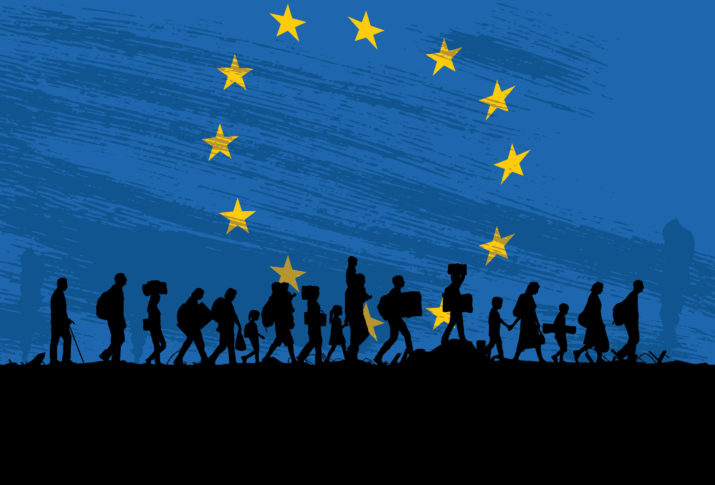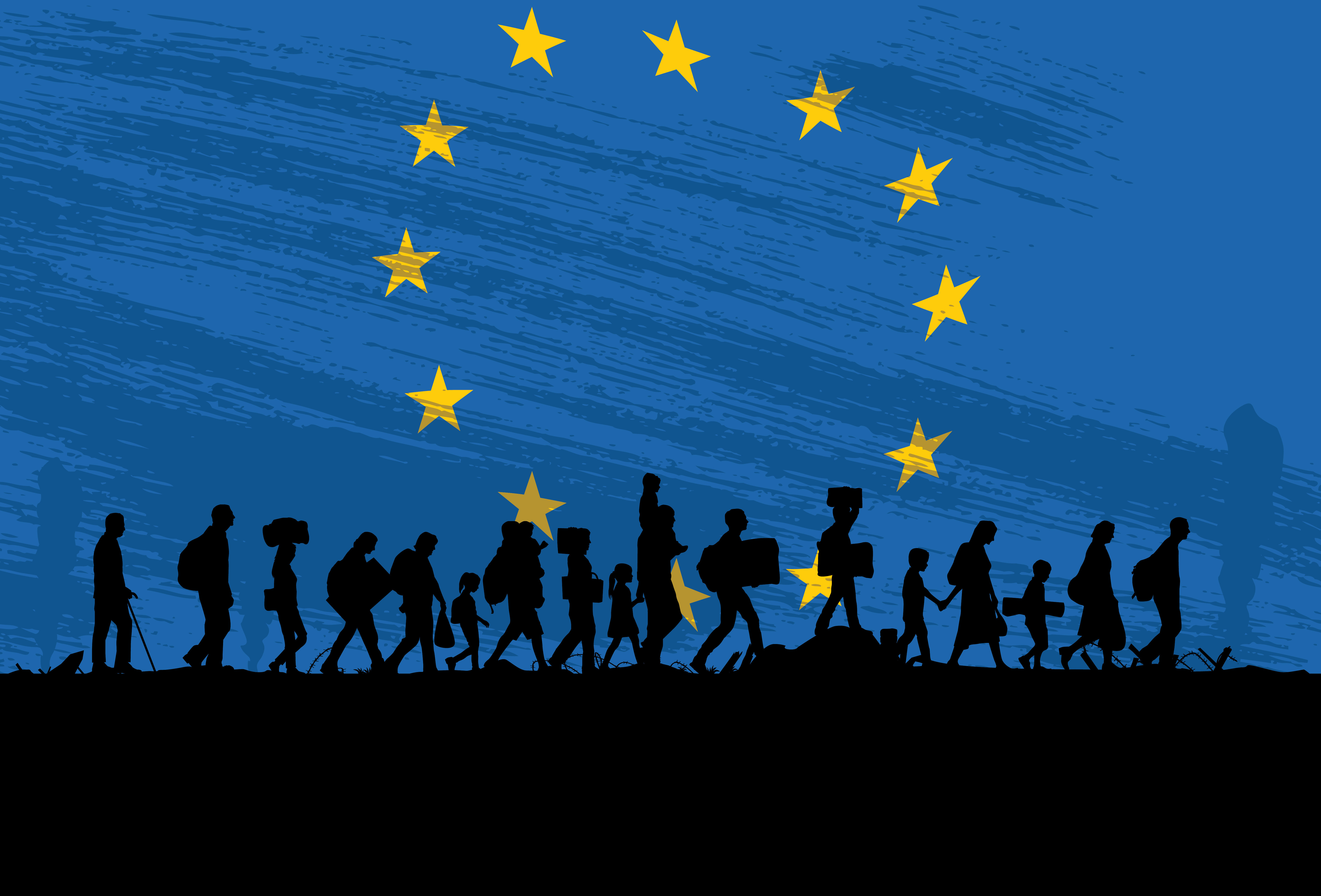
Confronting the “Crisis:” Refugees and Populism in Europe

This is part of our Campus Spotlight on the Consortium on Forced Migration, Displacement, and Education (CFMDE).
Since the beginning of 2015, about 2.5 million people from Syria, Afghanistan, Iraq, and other countries have travelled to Europe, typically without state authorization, to seek asylum and refuge. This state of affairs has prompted many observers to speak of a “refugee crisis,” one that threatens to undermine the European Union’s regime of border regulation and overwhelm its member states’ capacities for humanitarian care. As challenging as the current situation may be, however, its characterization as a crisis is also somewhat curious. After all, this is hardly the first time that European nation-states have responded to significant numbers of unauthorized migrants. In addition, far more people remain displaced in Turkey and Syria, for example, than in the entire EU, and many EU member states have far greater material and institutional resources at their disposal than other major “receiving countries.” Why, then, do the recent flows of refugees constitute a crisis for Europe? And why the language of crisis now?
Drawing on recent ethnographic research and anthropological theorizing, this course examines the everyday discourses and practices that shape how people in Africa and the Middle East seek to cross European borders. It investigates the innovations in surveillance, security, and bureaucratic management that the EU and its member states have employed to regulate migrants’ entry. It explores the techniques with which state agencies have sought to govern and care for refugees once they arrive in Europe. And it interrogates the populist rhetoric and violence that have targeted refugees as threats to national and European integrity. Throughout the semester, our readings and discussions will reflect on the epistemology and politics of “crisis.” How do we know when we are in a crisis, and who or what is authorized to make the determination? Is the declaration of a crisis a neutral act that announces a break from “normal” affairs in a self-evident, objective way? Or is it instead an ideologically charged claim that varied actors employ to mobilize public fears, desires, and resentments—and to promote particular visions of the nation, citizenship, and state obligation?
Required Texts
Ruben Andersson. 2014. Illegality, Inc.: Clandestine Migration and the Business of Bordering Europe. Berkeley, CA: University of California Press.
Nitzan Shoshan. 2016. The Management of Hate: Nation, Affect, and the Governance of Right-Wing Extremism in Germany. Princeton, NJ: Princeton University Press.
Miriam Ticktin. 2011. Casualties of Care: Immigration and the Politics of Humanitarianism in France. Berkeley, CA: University of California Press.
Course Requirements
1. Contributions to a “critical dictionary” of terms related to mobility, displacement, asylum, and populism. This dictionary is “critical” in the sense that it does not merely define the terms as they are commonly employed in scholarship and public discourse. Rather, it reflects on those terms’ tacit or explicit premises, claims, and implications. What does the use of a particular term (like “refugee”) say about contemporary mobility practices; institutional efforts to promote, regulate, and/or condemn them; and the people who undertake them? What insights does a particular term both enable and foreclose? In what ways is its common(sense) definition and usage problematic?
2. The class as a whole will reflect on which terms to include in the dictionary, with small groups of students “commissioned” to compose a cluster of entries. Each entry should be 1/2 – 3 typed pages in length.
3. A midterm essay (5 – 7 typed pages) that synthesizes key themes from the first half of the semester. I will provide two prompts and expect you to select one as the basis of your essay. You may also generate your own topic, although you must discuss it with me in advance.
4. A final paper (8 – 10 typed pages) on a topic of your choice. You may develop this paper from the critical dictionary or the midterm essay, although you may also write on a new topic if you prefer. At a minimum, your paper should cite at least three of our assigned readings. It can incorporate independent reading, focused media analysis, or other kinds of research.
Before you begin serious work on this assignment, you must turn in a brief proposal (1/2 – 1 typed page) that will allow me to offer constructive feedback. I will offer advice that will help you to keep your paper focused and manageable.
5. A concise (2-minute) presentation of your final paper during the last class meeting.
Schedule of Meetings, Readings, and Assignments
Part I. Genealogies: Refugeedom and Crisis
M, 9/4 Course Preliminaries
W, 9/6 Contemporary Representations
- Nicholas Schmidle. 2015. “Ten Borders.” The New Yorker (October 26). Available at: newyorker.com/magazine/2015/10/26/ten-borders. [RD]
- United Nations High Commissioner for Refugees. 2017. “Trends at a Glance” and Chapters 1, 2, 3, and 5 in Global Trends: Forced Displacement in 2016. Pages 2-29 and 38-47. [RD]
- Daphne Matziaraki. 2016. 4.1 Miles. Available at: https://www.nytimes.com/2016/09/28/opinion/4-1-miles.html. [RD]
M, 9/11 Statelessness and the Crisis of Human Rights
- Hannah Arendt. 1973. “The Decline of the Nation-State and the End of the Rights of Man.” In The Origins of Totalitarianism. New York: Harcourt, Brace, and Jovanovich. Pages 267-302. [RD]
- Reinhart Koselleck. 2006. First excerpt from “Crisis.” Michaela W. Richter, trans. Journal of the History of Ideas 67(2): 358-361. [RD]
W, 9/13 An Emerging Refugee Regime
- Peter Gatrell. 2013. “Europe Uprooted: Refugee Crises at Mid-century and ‘Durable Solutions.’” In The Making of the Modern Refugee. Oxford: Oxford University Press. Pages 89-117. [RD]
- Reinhart Koselleck. 2006. Second excerpt from “Crisis.” Michaela W. Richter, trans. Journal of the History of Ideas 67(2): 368-377. [RD]
- Karl Marx and Friedrich Engels. 1848. Excerpt from Part I of Manifesto of the Community Party (Marxists Internet Archive). Pages 17-18. [RD]
M, 9/18 The Politics of “Refugee Crisis”
- Antonio Gramsci. 1971. Excerpts on “hegemony” and “crisis.” In Selections from the Prison Notebooks. Quintin Hoare and Geoffrey Nowell Smith, eds. New York: International Publishers. Pages 12-13, 181-182, 210-211, 275-276. [RD]
- Seth M. Holmes and Heide Castaneda. 2016. “Representing the ‘European Refugee Crisis’ in Germany and Beyond: Deservingness and Difference, Life and Death.” American Ethnologist 43(1): 12-24. [RD]
- Annastiina Kallius, Daniel Moterescu, and Prem Kumar Rajaram. 2016. “Immobilizing Mobility: Border Ethnography, Illiberal Democracy, and the Politics of the ‘Refugee Crisis’ in Hungary.” American Ethnologist 43(1): 25-37. [RD]
W, 9/20 Exception/Emergency
- Carl Schmitt. 2005. “Definition of Sovereignty.” In Political Theology: Four Chapters on the Concept of Sovereignty. George Schwab, trans. Chicago: University of Chicago Press. Pages 5-15. [RD]
- Giorgio Agamben. 2005. Excerpt from “The State of Exception as a Paradigm of Government.” In State of Exception. Kevin Attell, trans. Chicago: University of Chicago Press. Pages 1-5. [RD]
- Ghassan Hage. 2016. “État de Siège: A Dying Domesticating Colonialism?” American Ethnologist 43(1): 38-49. [RD]
Part II. Mobility, Policing, and Care at (and beyond) Europe’s Borders
M, 9/25 Governmentality and the Regulation of Mobility
- Michel Foucault. 1991. “Governmentality.” In The Foucault Effect: Studies in Governmentality. Graham Burchell, Colin Gordon, and Peter Miller, eds. Chicago, IL: University of Chicago Press. Pages 87-104. [RD]
- John Torpey. 1998. “Coming and Going: On the State Monopolization of the Legitimate ‘Means of Movement.’” Sociological Theory 16(3): 239-259. [RD]
ADDITIONAL RESOURCE:
- Gregory Feldman. 2012. “Biometrics: Where Isn’t the Security Threat?” In The Migration Apparatus: Security, Labor, and Policymaking in the European Union. Stanford, CA: Stanford University Press. Pages 117-149. [RD]
LISTS OF POTENTIAL CRITICAL DICTIONARY TERMS DUE
W, 9/27 The Illegality Industry
- Andersson, Illegality, Inc., Introduction and Chapter 2. Pages 1-25 and 66-97.
M, 10/2 Making “Refugees,” Becoming “Illegal”
- Liisa H. Malkki. 1996. “Speechless Emissaries: Refugees, Humanitarianism, and Dehistoricization.” Cultural Anthropology 11(3): 377-404. [RD]
- Andersson, Illegality, Inc., Chapter 3. Pages 98-130.
W, 10/4 Borders, Sovereignty, Spectacle
- Wendy Brown. 2010. Excerpt from “Waning Sovereignty, Walled Democracy.” In Walled States, Waning Sovereignty. New York: Zone Books. Pages 7-28. [RD]
- Andersson, Illegality, Inc., Chapter 4. Pages 137-173.
FILM EXCERPT: World War Z
M, 10/9 NO CLASS—FALL BREAK
W, 10/11 Camp Governance
- Michel Agier. 2011. “Introduction: From Vulnerable to Undesirable” and “Encampment Today: An Attempted Inventory.” In Managing the Undesirables: Refugee Camps and Humanitarian Government. Cambridge and Malden, MA: Polity Press. Pages 1-8 and 36-59. [RD]
- Andersson, Illegality, Inc., Chapter 5. Pages 177-207.
M, 10/16 Uncertain Times, Uncertain Documents
- Heath Cabot. 2012. “The Governance of Things: Documenting Limbo in the Greek Asylum Procedure.” PoLAR: Political and Legal Anthropology Review 35(1): 11-29. [RD]
- Andersson, Illegality, Inc., Chapter 6 and “Conclusion: Bordering on the Absurd.” Pages 212-40 and 273-281.
ADDITIONAL RESOURCE:
- Tobias Kelly. 2006. “Documented Lives: Fear and the Uncertainties of Law during the Second Palestinian Intifada.” Journal of the Royal Anthropological Institute 12(1): 89-107. [RD]
W, 10/18 FILM: Exodus
MIDTERM PAPERS DUE FRIDAY, OCTOBER 20
Part III. Humanitarian Exceptions: The Politics of Compassion in France
M, 10/23 The Politics of “Nonpolitical” Aid
- Ilana Feldman. 2007. “Difficult Distinctions: Refugee Law, Humanitarian Practice, and Political Identification in Gaza.” Cultural Anthropology 22(1): 129-169. [RD]
ADDITIONAL RESOURCE:
- Giorgio Agamben. 2013. “Introduction to Homo Sacer: Sovereign Power and Bare Life.” In Biopolitics: A Reader. Timothy Campbell and Adam Sitze, eds. Durham, NC: Duke University Press. Pages 134-144. (RD)
W, 10/25 Repression and Care
- Didier Fassin. 2005. “Compassion and Repression: The Moral Economy of Immigration Policies in France.” Cultural Anthropology 20(3): 362-387. [RD]
- Ticktin, Casualties of Care, “Introduction: The Politics and Antipolitics of Care.” Pages 1-26.
M, 10/30 Sans-Papiers and the Production of Compassion
- Ticktin, Casualties of Care, Chapter 1. Pages 29-59.
- Thomas W. Laqueur. 2009. “Mourning, Pity, and the Work of Narrative in the Making of ‘Humanity.’” In Humanitarianism and Suffering: The Mobilization of Empathy. Richard Ashby Wilson and Richard D. Brown, eds. Cambridge: Cambridge University Press. Pages 31-57. [RD]
W, 11/1 Morally Legitimate Suffering I: Illness and Gender-Based Violence
- Ticktin, Casualties of Care, Chapter 3 and first part of Chapter 4. Pages 89-139.
M, 11/6 Morally Legitimate Suffering II: Gender-Based Violence and Trafficking
- Ticktin, Casualties of Care. Second part of Chapter 4 and Chapter 5. Pages 139-191.
CRITICAL DICTIONARY ENTRY DRAFTS DUE
W, 11/8 Recasting Europe in the Wake of Empire
- Ticktin, Casualties of Care. Excerpt from Chapter 6 and “Conclusion: Engaging the Political.” Pages 192-201 and 221-225.
- Nicholas de Genova. 2016. “The European Question: Migration, Race, and Postcoloniality in Europe.” Social Text 34(3): 75-102. [RD]
- Movement of the Indigenous of the Republic. 2005. “We are the Indigenous of the French Republic!” Available at: decolonialtranslation.com/english/AppelEng.php. [RD]
- Houria Bouteldja. 2012. “Decolonizing Europe.” Available at: decolonial translation.com/english/decolonizing-europe.html. [RD]
Part IV. Managing Hate: The Governance of Populist Affect in Germany
M, 11/13 Neoliberalism, Integralism, Populism
- David Harvey. 2005. “Introduction.” In A Brief History of Neoliberalism. Oxford: Oxford University Press. Pages 1-4. [RD]
- Douglas Holmes. 2000. “Inner Landscapes” and “Factual Racism.” In Integral Europe: Fast-Capitalism, Multiculturalism, Neofascism. Princeton, NJ: Princeton University Press. Pages 3-16 and 116-137. [RD]
- Don Kalb. 2009. “Conversations with a Polish Populist: Tracing Hidden Histories of Globalization, Class, and Dispossession in Postsocialism (and Beyond).” American Ethnologist 36(2): 207-223. [RD]
W, 11/15 Regulating “Legitimate” and “Illegitimate” National Affect
- George Steinmetz. 1997. “Social Class and the Reemergence of the Radical Right in Contemporary Germany.” In Reworking Class. John R. Hall, ed. Ithaca, NY: Cornell University Press. Pages 335-368. [RD]
- Shoshan, The Management of Hate. “Preface” and Chapter 1. Pages xi-xiv and 3-28. (It’s okay to skim “Taming the Demons” on pages 6-10.)
M, 11/20 Geographic, Political, and Ethnic/Religious Differences
- Shoshan, The Management of Hate. Chapters 2 and 3. Pages 29-84.
W, 11/22 NO CLASS—THANKSGIVING
FINAL PAPER PROPOSALS DUE
M, 11/27 Democratic Repression and Political Delinquency
- Shoshan, The Management of Hate. Chapters 4 and 5. Pages 89-140.
W, 11/29 Knowing Extremism, Reforming Extremists
- Shoshan, The Management of Hate. Chapter 6 and first part of Chapter 7. Pages 141-181.
ADDITIONAL RESOURCE:
- Andrea Muehlebach and Nitzan Shoshan. 2012. Excerpts from “Post-Fordist Affect: Introduction.” Anthropological Quarterly 85(2): 317-319 and 326-329. [RD]
M, 12/4 Reforming Extremists, Managing the Antinationalist Nation
- Shoshan, The Management of Hate. Second part of Chapter 7, Chapter 8, and “Afterword.” Pages 182-226 and 261-267.
- Anna Sauerbrey. 2017. “How Germany Deals with Neo-Nazis.” The New York Times (August 23). Available at: nytimes.com/2017/08/23/opinion/germany-neo-nazis-charlottesville.html. [RD]
W, 12/6 NO CLASS—ADVISING DAY
REVISED CRITICAL DICTIONARY ENTRIES DUE
M, 12/11 Revisiting Borders, Populism, and Crisis
- Etienne Balibar. 2002. “What is a Border?” In Politics and the Other Scene. London: Verso. Pages 75-86. [RD]
- Hugh Gusterson. 2017. “From Brexit to Trump: Anthropology and the Rise of Nationalist Populism.” American Ethnologist 44(2): 209-214. [RD]
ADDITIONAL RESOURCE:
- Etienne Balibar. 2004. “World Borders, Political Borders.” In We, the People of Europe? Reflections on Transnational Citizenship. Princeton, NJ: Princeton University Press. Pages 101-115. [RD]
W, 12/13 Concluding Discussion and Final Paper Presentations
- Charles Heller et al. 2016. “Crisis.” In Europe/Crisis: New Keywords of “the Crisis” in and of “Europe.” Nicholas De Genova and Martina Tazzioli, eds. New York: Zone Books/Near Futures. Available at: http://nearfuturesonline.org/
- europecrisis-new-keywords-of-crisis-in-and-of-europe-part-2/. [RD]
M, 12/18 NO CLASS—COMPLETION DAYS
W, 12/20 NO CLASS—COMPLETION DAYS
FINAL PAPERS DUE FRIDAY, DECEMBER 22
Published on March 5, 2019.
Photo: Silhouette of a group of refugees walking with flag of Europe | Shutterstock




